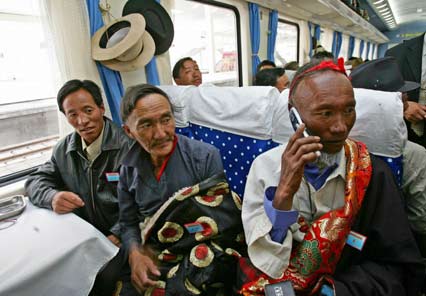
Passengers chat on board the first Beijing-to-Lhasa train moments
before it leaves the Beijing railway station July 1, 2006.
[Reuters] |
A train carrying about 600 passengers from Golmud, northwest China's Qinghai
Province, arrived at the Lhasa Railway Station at 00:31 am on Sunday, marking
the end of a maiden train run on Qinghai-Tibet Railway which was opened Saturday
morning.
The train, coded "Qing 1", left Golmud at 11:05 am on Saturday and ran across
the Qinghai-Tibet Plateau, dubbed the " roof of the world", before arriving in
Lhasa, capital of the Tibet Autonomous Region.
Those on board the maiden train included role models of builders of the
railway, representatives from the government, journalists from official media
including the Xinhua News Agency and the China Central Television.

Passengers chat on board the first Beijing-to-Lhasa train moments
before it leaves the Beijing railway station July 1, 2006.
[Reuters] |
Yu Hong, a 38-year old official with the State Council, told Xinhua that
passengers on the train not only enjoyed beautiful landscape during the trip,
but also got moved by warmheartedness of Tibetans.
"A lot of local ethnic farmers and herdsmen waved their hands to greet us
while waiting along the railway to watch the train passing by," Yu said.
Chen Shouzhong, a railway worker from Sichuan Province, said that he had some
headache but got recovered soon after treatment on altitude sickness on the
train.
"The railway will promote link between people in Tibet and other parts of
China," he said.
The successful operation of Qinghai-Tibet Railway broke American train
traveler Paul Theroux's prophesy that the Kunlun Range was "a guarantee that the
railway will never get to Lhasa."

The
first train from Lhasa Railway Station travels on a bridge heading for
Lanzhou of Gansu province in Lhasa, Tibet July 1, 2006.
[Reuters] |
The Qinghai-Tibet Railway stretches 1,956 kilometers from Xining to Lhasa.
Some 960 kilometers of its tracks are located 4, 000 meters above sea level and
the highest point is 5,072 meters, at least 200 meters higher than the Peruvian
railway in the Andes, which was formerly the world's most elevated track.
Tibet makes up one eighth of the Chinese territory, but without a railway,
passengers and goods had to be shipped by buses, trucks and planes. Little
access to traffic and high transportation costs have long hindered the region's
economic development.
The railway will link Lhasa with other major Chinese cities such as Beijing,
Shanghai, Xining, Chengdu and Guangzhou, according to the railway ministry
sources. It will also carry 75 percent of all the inbound cargo into Tibet,
cutting transportation costs and boosting local economy.

Passengers chat inside their compartment on board the first
Beijing-to-Lhasa train moments before it leaves the Beijing railway
station July 1, 2006. [Reuters] |
Before the train left Golmud, Chinese President Hu Jintao emphasized the
importance of environmental protection on the Qinghai-Tibet Plateau in a speech
marking the opening of the landmark railway.
"Railway workers and passengers traveling on the Qinghai-Tibet railway should
consciously treasure waters and mountains as well as grass and woods on the
Plateau, and they should help conserve the eco system and environment along the
railway," Hu said.
The Chinese government is to build three more railway lines in Tibet as
extensions of the newly-completed railway, which would link Lhasa, with Nyingchi
to the east, and Xigaze to the west, while the third will link Xigaze with
Yadong, a major trading town on the China-India border.
The new lines would be built in 10 years, and increase Tibet's total railway
length to more than 2,000 kilometers, media reports said.
The Qinghai-Tibet railway is 1,956 kilometers long, with 960 km of the track
located 4,000 meters above sea level and the highest point at 5,072 meters. The
project is dubbed an "engineering marvel" because people used to think the
perennial ice and slush along the route could never support tracks and
trains.